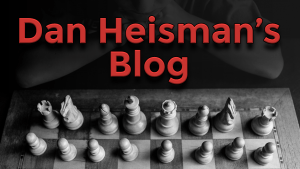Q&A with Coach Heisman Apr 4, 2014
"What's the going rate for selling 100 rating points?"
Let's start with "It's illegal and I wouldn't do it, and neither should you or anyone else!" Now that we got that out of the way, I can then state "Interesting question! I've never had that one before on my show!"
First, if you were trying to sell 100 rating points to one player in a US Chess Federation event, you couldn't just resign on move 1 or drop your queen on move 3 and resign. That would be obvious and the TD would likely forfeit both players. Consequently, you have to be a little more subtle and that takes time, but time is money so the cost goes up. But there's a catch! Almost all events are swiss and you would only play a player once. Therefore, he could not sell you 100 rating points (unless your rating was under 500 or so and you could pick up mucho rating points if you play four games and get into bonus territory, too). So for US OTB play that only leaves a match, and a 4-0 score by a 1400 over a 1600 rings plenty of bells, so that's not so easy, either.
But for online play, you can sell 100 points by resigning on move 1 four times. That takes almost no time so it should be cheap  . This all rather moot since why would anyone want 100 rating points online except to win a bet, or retire at a certain number? It's not like those ratings are being used for invitations to prestigious tournaments. Finally, of course, anyone who buys rating points they don't deserve will quickly lose them right back when they play and similarly, anyone selling the points (sandbagging?) will gain them right back, too.
. This all rather moot since why would anyone want 100 rating points online except to win a bet, or retire at a certain number? It's not like those ratings are being used for invitations to prestigious tournaments. Finally, of course, anyone who buys rating points they don't deserve will quickly lose them right back when they play and similarly, anyone selling the points (sandbagging?) will gain them right back, too.
Speaking of cheating, I am occasionally asked about those who prefer not to play online chess because of potential opponent cheating (mainly using a chess engine), and my answer is always the following:
I would not be too concerned because there are only so many possibilities involving an opponent using an engine to cheat, and none appear too concerting:
- Your opponent is using a computer to cheat on every move. In that case your opponent would be rated about 3200. In this case, why would a 3200 want to play you, and why would you play him?
- Your opponent is only using the computer just enough to win every game against human opponents. In this case the opponent is still rated about 3200, so the same lack of concern applies.
- Your opponent is normally much weaker than you, but uses a computer to help him occasionally obtain a higher playing strength (and rating). For example, if he is normally 1000 strength but uses a computer to play 1800 and you are 1800, then instead of you beating him all the time, you only beat him half the time. Again, his rating properly shows his "with computer" strength but, in this case, it just makes him a more desirable opponent. If his occasional cheating makes him much higher than you then, once more, you'll see this in his rating and play him only if you want to play someone with that higher rating.
- A player just cheats in important games or, more rarely, just cheats against you and no one else. There was a player in the Team 45 45 League who clearly cheated only in meaningful league games. His won-loss record against peers was about 32-3-1, and his three losses, if I remember correctly, only occurred after his team had clinched a playoff spot. This type of "selective" success is quite noticeable and the player was caught cheating. As for the player who just cheats against you and otherwise maintains a normal rating by playing legally against everyone else, I have almost never heard of this happening (so its not very common!), but it should be easy to spot if his 1400 rating belies his 3200 level play. Again, very rare but not impossible.
In pretty much every case, you really don't have to worry. I believe it was IM John Watson who posted a very similar argument, also coming to the conclusion that it's a waste of energy worrying about whether your opponent is cheating. When I read his logic, my conclusion was "That's exactly how I feel!" Worry about your next move, not your opponent cheating. Anything that detracts from trying your best to find the best move in a reasonable amount of time is likely counterproductive.
Worry about your next move, not your opponent cheating. Anything that detracts from trying your best to find the best move in a reasonable amount of time is likely counterproductive.
By the way, several students reported that one of the "highlights" of extensive tactical study is that they eventually get to spot more difficult tactics and apply them in their games. This occasionally leads to a chagrined (and/or immature) opponent claiming that the only way they could have spotted the tactic is with computer help. In a sideways sort of way, the students considered this accusation as a compliment and somewhat a rite-of-passage badge of honor .
.
"How can two chess engines on the same computer have a different playing strength?"
Easy! One is a good program and the other is not so good (maybe the latter was just written yesterday). Just the same as how two programs of any type that try to do the same thing might differ greatly on how well each does it. For example, maybe you like Firefox or Chrome for web browsing better than Internet Explorer (or vice versa). To check out one rating list of engines tested on the same computer hardware, here's the CCRL 40/40 link. On that subject, the TCEC engine competition (link) is nearing the end of Stage 2 with all the favorites (Komodo, Stockfish, Houdini, Rybka) looking like they will qualify for the Stage 3 semi-final. Engine "Fire" has been the surprise of Stage 2.
During the show NM Aww-Rats, of the very popular group NM Aww-Rats Free Video Lessons! (link), was kind enough to post a direct link that would allow readers and viewers to directly join our Dan Heisman Learning Center, which features slow games and as much of my advice as we can make available. That link is
http://www.chess.com/groups/join?id=15640.
So feel free to use this link whenever discussing our DHLC group with any interested party. The nice thing about our two groups is that we have synergy: we are both interested in helping players improve and we don't offer competing activities, but rather complementary ones. Of course, on Chess.com you can join as many groups as you wish, so the more the merrier .
.
BTW, the DHLC has a store (Store Link) where all net proceeds go to our charity for chess juniors at The Philadelphia Foundation. Check out some of the pictures of our members wearing store gear at this link.
Also on the show I asked what the viewers felt about the following suggestion:
Having a forum at the Dan Heisman Learning Center where members who could not attend the show could ask questions for the next show. Before the show, I would scan the forum for questions submitted since the previous show and use a couple of interesting ones.
The obvious drawback of this is that the viewers watching the show would have a couple of less questions asked, and the members submitting the question might never watch the show. Still, I said that if a high enough percentage wanted this, I would give it a trial. The response was not overwhelming as I did not see much feedback on the channel (not that I am able to peruse the channel so completely during a show since I am primarily using it to scan for questions).
The next show will be Apr 18, as always at 5-6:30 PM ET. Hope to see you there!






